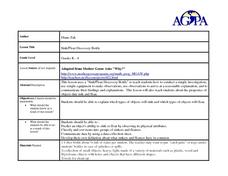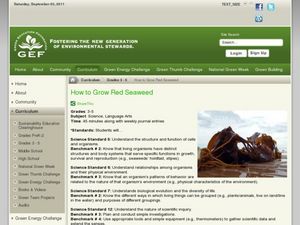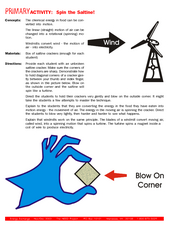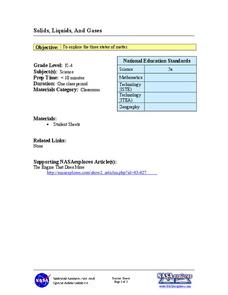Curated OER
Agriculture in Your Life
Young scholars examine the agricultural sources of everyday products and identify food products outside traditional farming circles. They discuss the background information, and complete activity sheets, locating various commodity...
Curated OER
Basic Needs of Living Things - Lesson Two
Fourth graders study and identify the basic needs of a variety of organisms. Terrariums and aquariums are used to demonstrate what plants, animals, and fish need to stay alive. These two classic models are used to effectively convey what...
Curated OER
Basic Needs of Living Things - Lesson One
An interesting way of teaching about basic needs of different organisms awaits your fourth graders. Pupils take part in class discussions and demonstrations which should lead to a greater understanding of how to determine basic needs. As...
Curated OER
Interplanetary Travel Guide
In groups of six, middle school space scientists create an imaginative travel brochure for attracting visitors to the planet Mars. Information must include surface features and atmospheric conditions. Although time-consuming, this is a...
Berkeley Engineering and Mentors
Marshmallow Challenge
Here is a lesson plan in collaboration cleverly disguised as an engineering design activity. There is no background material for you to teach here, just instructions about materials and rules for participating groups. Use this as an...
Curated OER
Sink/Float Discovery bottle
Investigate which items float and which ones sink using this resource. Learners participate in an activity in which they investigate this phenomena. Then they describe the experimental process, and learn how to display their results.
Curated OER
How To Grow Red Seaweed
Pupils explore ocean biology by participating in a plant growing activity. In this seaweed lesson, students identify the importance and uses of seaweed in the ocean and examine different seaweed samples. Pupils utilize an aquarium,...
Curated OER
Spectral Surprise
Young scholars create spectral colors. In this hands-on science lesson, students examine the electromagnetic spectrum as they follow steps to create a model that separates and displays light.
Curated OER
Snowflake Crystals
Fourth graders explore physical changes and the true life story of Wilson Bentley. They observe the changes that take place with snowflakes. Students discuss what happens when snow flakes melt. They create their own snowflakes using...
Curated OER
Heat: Mini Unit
Students experiment with heat. In this physical science lesson, students engage in hands-on activities to develop concepts related to heat. Students offer explanations for their observations using given vocabulary.
Curated OER
What is Matter?
Students create a definition of matter. In this physical science lesson, students work in pairs to sort items printed on cards into several categories (matter, non-matter, and unsure) and agree on a definition of matter.
Curated OER
Bucket Brigade
Students participate in a physical fitness activity about water. In this water conservation lesson, students discuss how to conserve water and the amount of water most people use in a day. To illustrate this amount students move 70...
Curated OER
Spin the Saltine!
Students investigate chemical energy. In this physical science lesson, students blow on saltine crackers to demonstrate how chemical energy in food can be converted to motion. Students compare the saltine cracker experiment to how...
Curated OER
The Greenhouse Effect in a Jar
Students explore climate change by participating in a physical science experiment. In this greenhouse effect instructional activity, students discuss the impact global warming has on our environment and how it works. Students utilize a...
Curated OER
Seeing and Feeling Sound Vibrations
Groups rotate through a series of stations and work with a partner to observe sound waves. Children describe sound in terms of pitch, volume, and frequency. To apply their new knowledge, the class considers how these observations can...
Curated OER
Cooking with the Sun
Students explore using energy from the sun for heating and cooking as they build and compare the performance of four solar cooker designs. This excellent two-day lesson has groups of students build and test a variety of solar cookers....
Curated OER
Spin, Spin, Spin That Body!: Figure Skating, Physics, Science, Winter Sports, Olympics
Students learn the scientific principles of centripetal force through research and experimentation.
Curated OER
Burning It Up
Students explore energy as it relates to body function. Data about the personal physical activity of students is gathered and entered into a database which is utilized to test hypotheses made.
Curated OER
Human Anatomy- How Do We Move?
Learners examine the muscular system. In this muscular system lesson, students first draw a realistic representation of their leg or arm bones. Learners do several activities to attach these bones to "joints" with string to simulate the...
Curated OER
The Brain: Control Central
Students investigate the brain as the organ that regulates all of their physical, emotional, and cognitive responses. Some of the components of mental illness are examined inn this instructional activity.
Curated OER
Food Webs
Students identify predator/prey relationships based on the food web of the tropical rain forest ecosystem and realize they need a food web for survival. In this food web lesson plan, students complete a role play activity being animals...
Curated OER
Solids, Liquids, and Gases
Students investigate and explore the three states of matter. They read and discuss the NASA article "The Engine That Does More," identify examples of each state of matter, and as a class complete a section of two worksheets. They...
Curated OER
Gravity (Newton's Laws of Motion): A Weighty Subject
Learners identify Newton's Laws of Motion. They students explore Newton's Laws of Motion and apply the second law with a classroom activity. The videos will provide visual examples of the effects of gravity while riding on a roller coaster.
Curated OER
Is It There?
Learners participate in a lesson designed to illustrate these concepts using simple materials. They use Science process skills to observe, measure, predict, make inferences, and communicate while completing the activity. Proper safety...

























